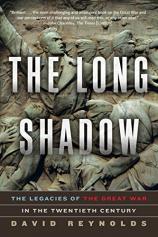The Long Shadow: The Legacies of the Great War in the Twentieth Century
Review
The Long Shadow: The Legacies of the Great War in the Twentieth Century
Most historians agree that the First World War caused the Second World War, which in turn caused the Cold War. Forever dividing what had once been quarrelsome but minimally civil European royal houses, seeming to enrich one nation and impoverish others, the brutal events of 1914-1918 made the resurgence of conflict inevitable.
Award-winning author David Reynolds, professor of International History at Cambridge University, develops his thesis with painstaking attention to detail. He reveals a post-1918 Great Britain whose large empire (if one ignores the niggling Irish question) provided it pride and profit. Across the Channel, Germany gnawed on its utter humiliation, poised for a Hitler; across the Atlantic, America hovered like a prosperous, portly uncle. The author seeks to put these players, particularly the British, in their proper places on the board. Britons, he states, “are fixated with 1916…when the Battle of the Somme began on July 1 and 20,000 British Tommies died in a morning.”
"Award-winning author David Reynolds, professor of International History at Cambridge University, develops his thesis with painstaking attention to detail."
Trawling through not only the political paperwork of the century that lay ahead, but also its literature and cultural indicators, Reynolds identifies the First World War as England’s “first truly literate war,” memorialized not only in letters home but in a unique strain of war poetry and Churchill's immortal speeches. In examining the changes to the very name of the 1914-18 horrors, Reynolds points out that it could no longer be the “Great War” and certainly not the “war to end all wars” once the next world struggle rose up. Churchill would call it "their finest hour" while Roosevelt “toyed with various titles," even asking the American public to write in with suggestions.
The end of the First World War was seen to have been too open-ended, so the settlement of the Second had a stern finality; from the seeds of both sprang the perilous posturings, escalations and many “undeclared wars” of the last half of the century. If the gassings and the muddy, crawling pace of the first war were unholy, the atrocities of the second brought the word “genocide” into the forum of public discourse and gave the world a new, unforgettable term: holocaust.
Reynolds asserts that the British experience of the long shadow cast by the Great War was of a proud people united to battle “for the freedom of others.” And while the first war devastated the nations on the Continent, Britain enjoyed an immediate aftermath that was “in fundamental ways more positive” --- an expansion of empire, a sense of “shared identity” --- that endures, even in a more savvy, cynical cultural climate.
Reviewed by Barbara Bamberger Scott on May 16, 2014
The Long Shadow: The Legacies of the Great War in the Twentieth Century
- Publication Date: June 8, 2015
- Genres: History, Nonfiction
- Paperback: 544 pages
- Publisher: W. W. Norton & Company
- ISBN-10: 0393351289
- ISBN-13: 9780393351286











